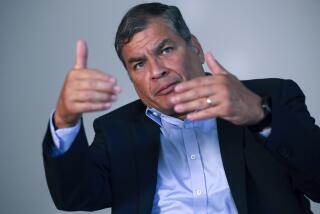Ecuadorâs Extended Carnival
In the pre-Lenten Carnival season, life turns upside down for three frantic days. In Ecuador, it takes longer. Some may argue that in Ecuador the madness began last July 7, the day that Abdala Bucaram, better known as âEl Loco,â was elected president. That political carnival continues, and an even larger crisis--economic disaster--looms unresolved on the horizon.
At one time last week, there were three people simultaneously claiming to be Ecuadorâs president. Over the weekend, Vice President Rosalia Arteaga was appointed interim president, supposedly for only a few days. But this is Carnival time and anything can happen so, no surprise, Arteagaâs acceptance speech on Sunday gave the impression she plans to stay in the presidential chair for as long as she can.
Even when the constitutional crisis is resolved, the pending economic disaster will remain. It is a structural problem that can only be addressed by a determined president willing to make unpopular reforms.
When Bucaram won the presidency, campaigning on a populist platform, he appealed to the poor with promises of increased spending on social needs. Then he hired Domingo Cavallo, the former economy minister of Argentina, to draw a plan for economic readjustment. The centerpiece was a system of convertibility that pegged the local currency to the U.S. dollar, backing it with hard-currency reserves. Implementation required a series of congressionally approved measures that included revised labor laws, new taxes and higher rates for services such as electricity, phones and gas.
The plan put Bucaram at odds with the poor, the media and the business community, a political blunder of no small moment. This was the background for the 48-hour general strike that eventually unseated Bucaram on Sunday.
So what will happen now to the planned series of privatizations that included the state oil monopoly, Petroecuador, and the national electricity and telecommunications industries? Dumping the plan would probably drive foreign investors out of the country, and if they and their dollars leave, how will government restructure its foreign debt and deal with the enormous unemployment and poverty rates?
It was a time for political courage; in Ecuador it has become just another Carnival act.
More to Read
Sign up for Essential California
The most important California stories and recommendations in your inbox every morning.
You may occasionally receive promotional content from the Los Angeles Times.










